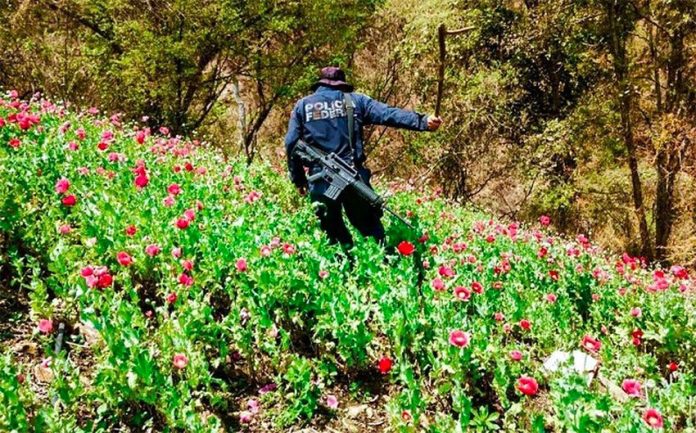The area of land on which opium poppies are cultivated grew by 21% between 2015 and 2017, according to the United Nations Office on Drugs and Crime (UNODC).
A new UNODC report, completed in conjunction with the Mexican government as part of the Illicit Crops Monitoring Program, said that between July 2015 and June 2016 poppies were grown on 25,200 hectares.
In the following year, poppies covered 30,600 hectares.
The monitoring program, conducted via satellite and navy aircraft flyovers, identified three main poppy production regions.
The largest extends across the Sierra Madre Occidental in the states of Sinaloa, Chihuahua and Durango, a region known as the Golden Triangle.
Large opium poppy crops were also detected in the Sierra Madre del Sur of Guerrero and Oaxaca and in the north of Nayarit.
Mexico’s efforts to eradicate the crops also increased.
Óscar Santiago Quintos, head of the PGR drug policy office, said authorities destroyed 29,692 hectares of poppies last year compared to 26,436 hectares in 2015.
UNODC Mexico representative Antonino de Leo called on the incoming federal government to formulate and adopt policies that will prevent the expansion of poppy production by focusing on the socioeconomic needs of the people who live in the regions where the plant is grown.
“I would especially like to invite the elected authorities to contribute to the eradication efforts with the formulation and execution of alternative, broad and sustainable development programs in the areas where illegal crops are grown . . .” he said.
“Alternative development doesn’t center on drugs, it focuses on people and communities. Alternative development programs help farmers to escape the poverty trap of illicit crops with measures that favor rural development and improve infrastructure, inclusion and social protection,” de Leo added.
He said the UNODC doesn’t currently have enough information to calculate total opium production nor has it determined how many people are involved in the cultivation. However, those figures could be quantified by future studies, de Leo said.
He added that the UNODC stood ready to help the incoming government in the fight against illegal drug production.
“I would like to make available to the authorities of the elected government the knowledge, experience, advice and technical assistance of the United Nations Office on Drugs and Crime. Efforts against drugs, crime and corruption [must] focus on sustainable development,” de Leo said.
Another option that the new government may be considering is the legalization of the cultivation of opium poppies for use in the pharmaceutical industry.
In August, the Guerrero Congress almost unanimously approved a proposal to decriminalize the cultivation of poppies for medicinal purposes but requires federal support in order for it to become law.
Community leaders from the Sierra region of Guerrero appealed in July to president-elect López Obrador to legalize poppy cultivation, while incoming interior secretary Olga Sánchez Cordero has said that legalizing drugs is a possibility as part of the quest to bring peace to the country.
Source: Milenio (sp)
